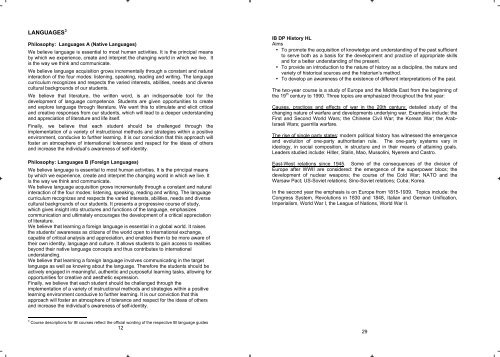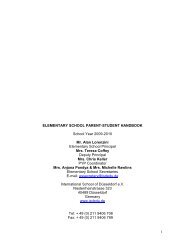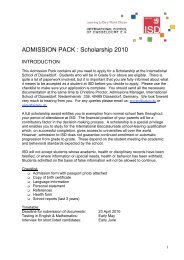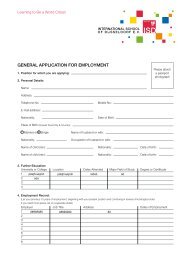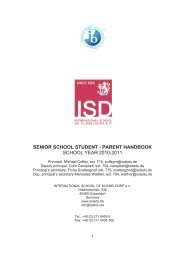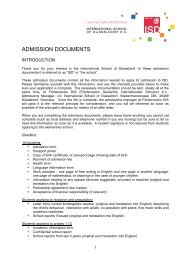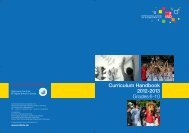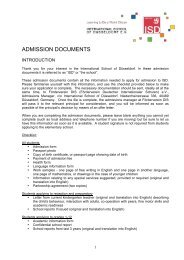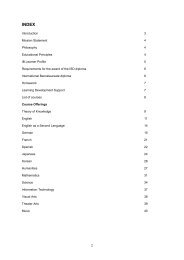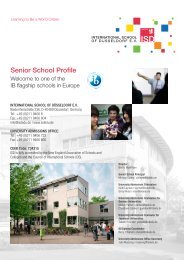Curriculum Handbook 2012-2013 Grades 11-12 - International ...
Curriculum Handbook 2012-2013 Grades 11-12 - International ...
Curriculum Handbook 2012-2013 Grades 11-12 - International ...
Create successful ePaper yourself
Turn your PDF publications into a flip-book with our unique Google optimized e-Paper software.
LANGUAGES 3<br />
Philosophy: Languages A (Native Languages)<br />
We believe language is essential to most human activities. It is the principal means<br />
by which we experience, create and interpret the changing world in which we live. It<br />
is the way we think and communicate.<br />
We believe language acquisition grows incrementally through a constant and natural<br />
interaction of the four modes: listening, speaking, reading and writing. The language<br />
curriculum recognizes and respects the varied interests, abilities, needs and diverse<br />
cultural backgrounds of our students.<br />
We believe that literature, the written word, is an indispensable tool for the<br />
development of language competence. Students are given opportunities to create<br />
and explore language through literature. We want this to stimulate and elicit critical<br />
and creative responses from our students, which will lead to a deeper understanding<br />
and appreciation of literature and life itself.<br />
Finally, we believe that each student should be challenged through the<br />
implementation of a variety of instructional methods and strategies within a positive<br />
environment, conducive to further learning. It is our conviction that this approach will<br />
foster an atmosphere of international tolerance and respect for the ideas of others<br />
and increase the individual’s awareness of self-identity.<br />
Philosophy: Languages B (Foreign Languages)<br />
We believe language is essential to most human activities. It is the principal means<br />
by which we experience, create and interpret the changing world in which we live. It<br />
is the way we think and communicate.<br />
We believe language acquisition grows incrementally through a constant and natural<br />
interaction of the four modes: listening, speaking, reading and writing. The language<br />
curriculum recognizes and respects the varied interests, abilities, needs and diverse<br />
cultural backgrounds of our students. It presents a progressive course of study,<br />
which gives insight into structures and functions of the language, emphasizes<br />
communication and ultimately encourages the development of a critical appreciation<br />
of literature.<br />
We believe that learning a foreign language is essential in a global world. It raises<br />
the students' awareness as citizens of the world open to international exchange,<br />
capable of critical analysis and appreciation, and enables them to be more aware of<br />
their own identity, language and culture. It allows students to gain access to realities<br />
beyond their native language concepts and thus contributes to international<br />
understanding.<br />
We believe that learning a foreign language involves communicating in the target<br />
language as well as knowing about the language. Therefore the students should be<br />
actively engaged in meaningful, authentic and purposeful learning tasks, allowing for<br />
opportunities for creative and aesthetic expression.<br />
Finally, we believe that each student should be challenged through the<br />
implementation of a variety of instructional methods and strategies within a positive<br />
learning environment conducive to further learning. It is our conviction that this<br />
approach will foster an atmosphere of tolerance and respect for the ideas of others<br />
and increase the individual’s awareness of self-identity.<br />
IB DP History HL<br />
Aims<br />
• To promote the acquisition of knowledge and understanding of the past sufficient<br />
to serve both as a basis for the development and practice of appropriate skills<br />
and for a better understanding of the present.<br />
• To provide an introduction to the nature of history as a discipline, the nature and<br />
variety of historical sources and the historian’s method.<br />
• To develop an awareness of the existence of different interpretations of the past.<br />
The two-year course is a study of Europe and the Middle East from the beginning of<br />
the 19 th century to 1990. Three topics are emphasized throughout the first year:<br />
Causes, practices and effects of war in the 20th century: detailed study of the<br />
changing nature of warfare and developments underlying war. Examples include: the<br />
First and Second World Wars; the Chinese Civil War; the Korean War; the Arab-<br />
Israeli Wars; guerrilla warfare.<br />
The rise of single party states: modern political history has witnessed the emergence<br />
and evolution of one-party authoritarian rule. The one-party systems vary in<br />
ideology, in social composition, in structure and in their means of attaining goals.<br />
Leaders studied include: Hitler, Stalin, Mao, Mussolini, Nyerere and Castro.<br />
East-West relations since 1945. Some of the consequences of the division of<br />
Europe after WWII are considered: the emergence of the superpower blocs; the<br />
development of nuclear weapons; the course of the Cold War; NATO and the<br />
Warsaw Pact; US-Soviet relations; Sino-Soviet relations; Cuba; Korea.<br />
In the second year the emphasis is on Europe from 1815-1939. Topics include: the<br />
Congress System, Revolutions in 1830 and 1848, Italian and German Unification,<br />
Imperialism, World War I, the League of Nations, World War II.<br />
3 Course descriptions for IB courses reflect the official wording of the respective IB language guides<br />
<strong>12</strong><br />
29


